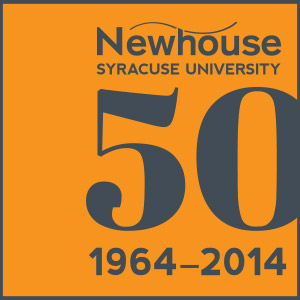When the executive master’s in communications management program launched in 1995 at the Newhouse School, the Internet was still in its formative years. Many students needed instructions on how to set up an email account. Students’ papers were submitted via FedEx, and class discussions took place in email strings up to 80 messages long—Blackboard wouldn’t be around until the late 90s.
Although the technology has changed, the program’s mission has remained the same: offer a distance-learning master’s degree program for experienced public relations professionals to further develop their skills. The program includes classes in leadership and management, and draws its curriculum from the Newhouse School, the Maxwell School of Citizenship and Public Affairs and the Martin J. Whitman School of Management, all at Syracuse University. Its distance-learning format offers flexibility to busy professionals. In 2015, the program will celebrate its 20th anniversary.
Nearly 400 students have participated in the executive master’s in communications management program since it began, and they represent more than 200 national and international organizations. Students come from all over the United States and more than 15 countries abroad. To be considered, applicants must have a minimum of five years working experience in public relations or a related field; most are mid-career professionals with substantial positions at their organizations.
Maria Russell, the program’s academic director, says prospective students know the program is for advanced professionals.
“They don’t want to know how to write news releases and brochures—they’ve done that. They want to go higher in their careers,” she says. “They want a seat at the table.”
Students are often drawn to the program for its distance-learning format. The program is organized so that students meet for a five-day residency on the SU campus twice a year: once in the fall and again in the spring. The group also meets for five days in the spring at Lubin House in New York City.
Between residencies, students participate in class discussions and readings through Blackboard, conference calls, or Skype, depending on student and professor preferences. Students complete the degree in two years.
Russell says the idea for a distance-learning master’s program was sparked on her travels as department chairwoman for the PR department. While speaking to alumni, many said they would love to go back to school for a master’s degree, but could not follow the time patterns at their local university. Because most adult-learning programs are scheduled for nights and weekends, Russell says students would get to a certain point in their program and fall behind because of last-minute business travel or other obligations.
“I came back from these trips wondering if the Newhouse School could help them,” Russell says. “And I discovered that SU had been doing independent study degree programs for many years. There were several at SU at the time, and adult learners would come to campus for short introductions to their classes, and once they left it was independent study.”
Russell says the program is not any easier than a tradition program, but a more flexible format. Newhouse faculty wanted the degree to be possible for working professionals with jobs, families and other commitments. When it began, there were only two other programs like it, Russell says, one in the United States and another in Scotland.
The Newhouse program continues to pave the way for PR education. The core curriculum includes PR classes in theory, research, and communications law, and managerial classes in marketing, finance and accounting. Electives are offered based on faculty input and student interest, and vary based on industry trends and technology. Recent popular electives cover crisis management, emotional intelligence and social media. Classes such as measurement and evaluation are recent additions, and Russell expects courses in analytics will come next. “Electives evolve as the industry evolves,” she says.
Russell says graduates of the program are in prime position to advance as managers. Many go on to teach, start a business or change careers.
Gary Grates, a member of the founding class and leader of corporate and strategy practices at W2O Group Worldwide, says the program re-energized his view of PR and exposed him to new facets of communication and business.
“It allowed me to look at it more holistically,” Grates says. “The program is designed beautifully to bring in outside specialties and content—not just communications but economics and brand marketing and finance.”
Another of the program’s benefits is the bonding experience of each class. The program has never had a class larger than 25 students, and the Newhouse School encourages students to stay in contact.
“Some 15 years later, we still talk and track what we’re doing in our lives and our careers,” says Grates. “The network and relationships are still going strong.”
—Juliana LaBianca
